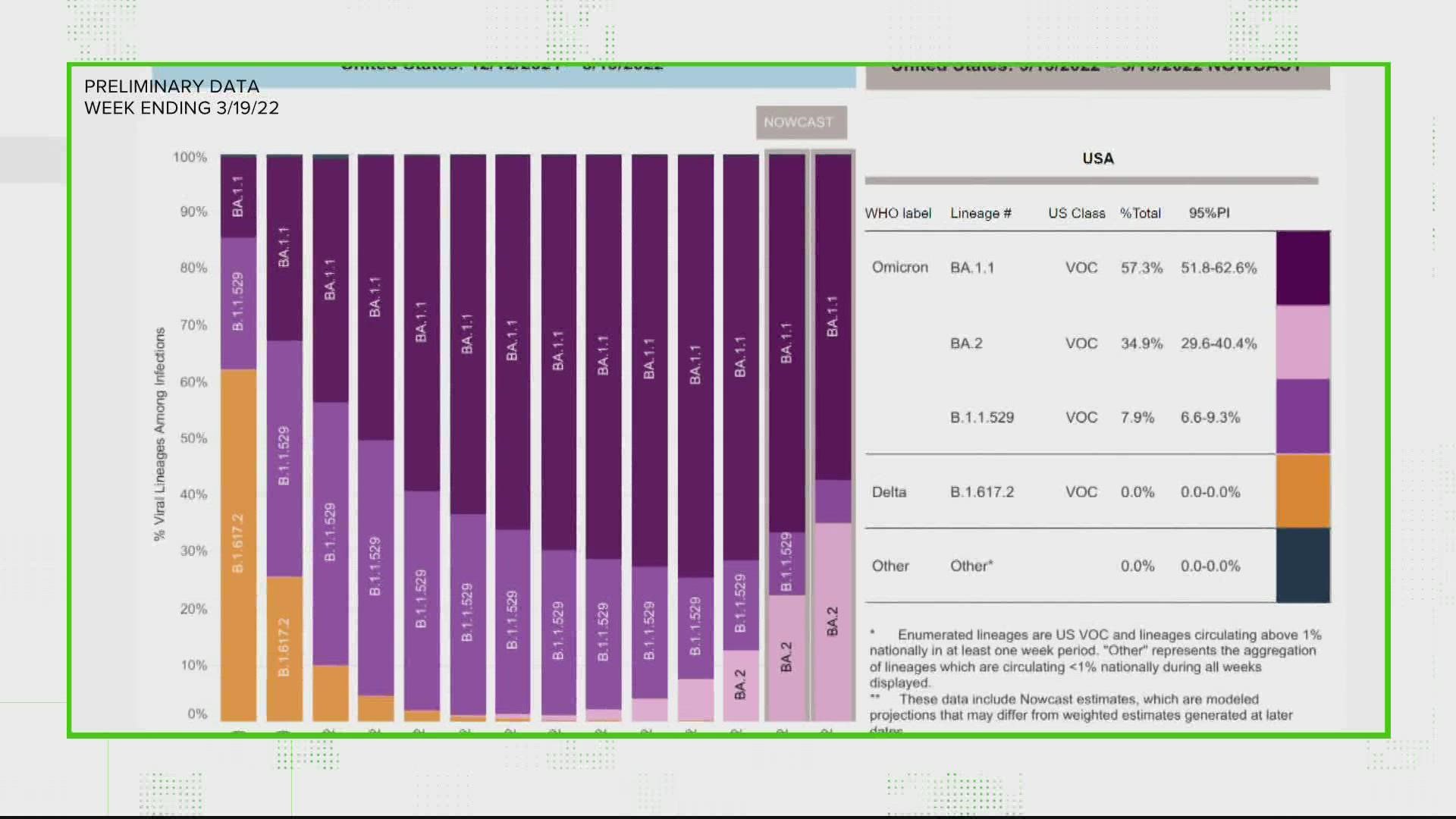WASHINGTON — After months of an omicron surge, the U.S. entered a few weeks of COVID respite in early March. Mask mandates were lifted, spring break plans were booked and people grew increasingly comfortable gathering indoors.
As things returned to relative normalcy in the United States, however, an omicron subvariant began spreading overseas, in places like Europe.
On Feb. 22, the World Health Organization said that the omicron sublineage BA.2 became the dominant variant circulating globally.
With so many questions about what this new omicron means for returning to a pre-pandemic lifestyle, we verified what doctors know and what they don't know yet.
THE QUESTION:
Is omicron BA.2 more contagious? Is it more deadly?
THE SOURCES:
- Dr. Amesh Adalja, Senior Scholar at Johns Hopkins Bloomberg School of Public Health
- Dr. William Schaffner, Professor of Medicine, Vanderbilt University
- Dr. Anthony Fauci, Chief Medical Adviser to the President of the United States, and Director of the National Institute of Allergy and Infectious Diseases
THE ANSWER:
Yes, it appears to be more contagious. No, it does not appear more deadly than omicron BA.1.
WHAT WE FOUND:
“It's clear that BA.2 is more contagious than BA.1," Dr. Adalja said. "It does not appear that BA.2 is more dangerous than BA.1.”
Dr. Schaffner and Dr. Fauci agreed.
" So right now [the UK is] seeing an increase in cases, they're not seeing an increase in the usage of intensive care unit beds, and they're not seeing an increase in all-cause mortality," Dr. Fauci said during a one-on-one interview with WUSA9 reporter Jess Arnold. "Which tells us—or at least strongly suggests— that the increase in the uptick of infections is not associated and accompanied by an increase in severity of disease."
THE QUESTION:
Is omicron BA.2 the dominant strain in the U.S.?
THE SOURCES:
- Dr. William Schaffner, Professor of Medicine, Vanderbilt University
- CDC Covid Data Tracker,
THE ANSWER:
Not at the time of publication.
WHAT WE FOUND:
“BA.2 is not yet the dominant strain in the U.S.," Dr. Schaffner said. "It's out there making its mischief and giving the original omicron strain a run for its money.”
That's backed up by CDC data. They estimate that nearly 35% of the COVID cases last week were BA.2. That's up from about 22% the week before (Mar. 6-Mar.12).
THE QUESTION:
Are COVID vaccines still protective against BA.2?
THE SOURCES:
- Dr. Amesh Adalja, Senior Scholar at Johns Hopkins Bloomberg School of Public Health
- Dr. William Schaffner, Professor of Medicine, Vanderbilt University
THE ANSWER:
"When it comes to the vaccines, they're able to prevent what matters with BA.2: severe disease, hospitalization and death," Dr. Adalja said. "The version of the vaccine is not geared toward any variant. It's geared toward the original version of the virus, but it's able to hold up and protect us from what matters. So I think that vaccines and the immunity from vaccination is going to be key at keeping people who get BA.2 out of the hospital and that's always been the goal of this pandemic is trying to preserve hospital capacity."
THE QUESTION:
If you had omicron BA.1, will that protect you from severe illness with omicron BA.2?
THE SOURCES:
- Dr. Amesh Adalja, Senior Scholar at Johns Hopkins Bloomberg School of Public Health
- Dr. William Schaffner, Professor of Medicine, Vanderbilt University
- Dr. Anthony Fauci, Chief Medical Adviser to the President of the United States, and Director of the National Institute of Allergy and Infectious Diseases
THE ANSWER:
Our experts say likely, yes.
WHAT WE FOUND:
“There is a lot of cross protection, so if you've been infected with BA.1, the chances are you're quite protected against infection with BA.2— or at least infection accompanied by severe disease," Dr. Fauci said. "Infection is difficult. This is a very transmissible virus so you could get infected even if you were previously infected before. The critical issue is, it's unlikely that you'll wind up getting severe disease.”
Dr. Schaffner says it's still unclear how this subvariant will spread.
“We don't know how widely it will spread in the United States, and whether it will prolong our transition from pandemic to endemic," he said.
Our experts say, if you’re vaccinated and boosted, and are not immunocompromised, you can feel comfortable in most settings without a mask.
THE QUESTION:
Have BA.2 cases been detected in D.C., Maryland and Virginia?
THE SOURCES:
- D.C., Maryland and Virginia health departments
THE ANSWER:
WHAT WE FOUND:
As of Mar. 23, the Maryland Department of Health has received reports of 145 BA.2 cases among Maryland residents, a spokesperson said.
As for D.C., a spokesperson for DC Health says between Jan. 6- Mar. 5, 55 BA.2 cases have been detected. That represents 6.4% of the total omicron cases detected in that time period.
"DC Health mandates all District hospitals and private laboratories sequence at least 10% of all SARS-CoV-2 positive specimens," a DC Health spokesperson said. "Any lab that cannot perform sequencing is to send specimens to the DC Public Health Laboratory (DC PHL), which has a capacity of 250 specimens per week."
The health department in Virginia told WUSA9, "about 20% of COVID-19 cases can be attributed to the BA.2 subvariant of omicron."

